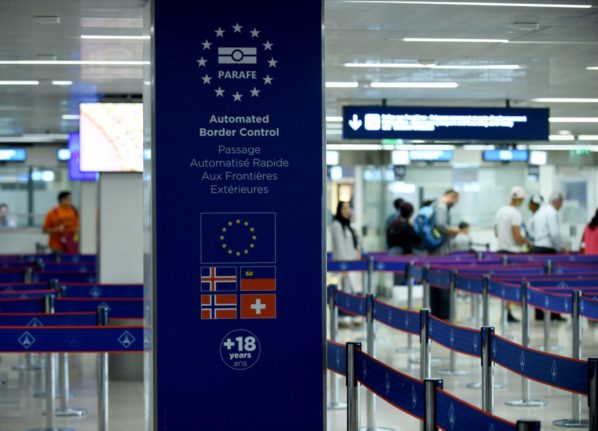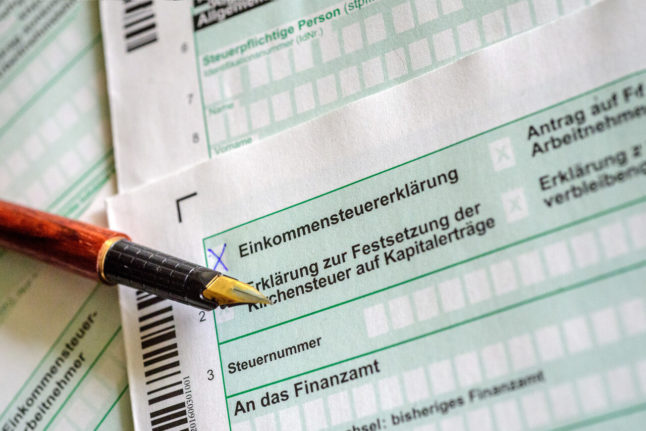The EU is preparing, after many delays, to introduce the EES system for travel in and out of Europe.
You can find a full explanation of how it works HERE, but in essence it is an enhanced passport check – registering biometric details such as fingerprints and facial scans and introducing an automatic calculation of how long you have stayed within the EU/Schengen zone in order to detect ‘over-stayers’.
And it’s already causing stress for travellers. We asked readers of The Local to share their questions here – and one of the biggest worries was how the system will work for dual nationals ie people who have a passport for both an EU country and a non-EU country.
EU passports
One of the main purposes of EES is to detect ‘over-stayers’ – people who have either stayed in the EU longer than their visa allows or non-EU nationals who have over-stayed their allowance of 90 days in every 180.
As this does not apply to EU nationals, people travelling on an EU passport are not required to do EES pre-registration and will continue to travel in the same way once EES is introduced – going to the ‘EU passports queue’ at airports, ports and stations and having their passports scanned as normal.
Non-EU
Non-EU travellers will, once EES is up and running, be required to complete EES pre-registration.
This means that the first time they cross an EU/Schengen zone external border they will have to go to a special zone of the airport/port/terminal and supply extra passport information including fingerprints and a facial scan.
This only needs to be done once and then lasts for three years.
Non-EU residents of the EU/Schengen zone
This does not apply to non-EU citizens who are permanent residents of an EU country or who have a long-stay visa for an EU/Schengen zone country – click HERE for full details.
Schengen zone passports/Irish passports
EES applies within the Schengen zone, so people with Swiss, Norwegian and Icelandic passports are treated in the same way as citizens of EU countries.
Ireland and Cyprus are in the EU but not the Schengen zone – these countries will not be using the EES system at their borders, but their citizens are still EU citizens so can continue to use EU passport gates at airports and will be treated the same as all other EU citizens (ie they don’t have to do EES pre-registration).
OK, so what if you have both an EU and a non-EU passport?
They key thing to remember about EES is that it doesn’t actually change any of the rules on immigration – it’s just a way of better enforcing the rules that are already in place.
Therefore the rules for dual nationals remain as they are – for most people which passport to travel on is a matter of personal choice, although Americans should be aware that if you have a US passport and you are entering the USA, you must use your American passport.
But it’s also important to remember that the passports of dual nationals are not ‘linked’ – therefore if you present an American passport at the Italian border, you will be treated exactly the same as every other American, there is no way for the border guard to know that you are also Italian.
Likewise if you are a UK-Germany dual national and you travel back to the UK on your German passport, you can expect to be treated the same as every other German at the border, and might be asked for proof of where you are staying in UK, how long you intend to stay etc – the system has no way of knowing that you are also British.
Therefore whether you have to complete EES pre-registration or not is entirely a matter of which passport you are travelling on – if you use your EU passport you won’t have to do it, if you use your non-EU passport you will.
It’s also possible to use two passports for the same trip – so let’s say you’re travelling from Spain to Canada – you enter Canada on your Canadian passport, and show your Canadian passport again when you leave. However, once you re-enter Spain you show your Spanish passport in order to benefit from the unlimited length of stay.
If you’re travelling between France and the UK via the Eurostar, Channel Tunnel or cross-Channel ferry, you need to remember that the Le Touquet agreement means that French passport checks take place in the UK and vice versa. You can still use both passports, but you just need to keep your wits about you and remember to hand the French one to the French border guards and the British one to British guards.
In terms of avoiding immigration formalities using two passports is the most efficient way for dual nationals to travel, but some people prefer to stick to one passport for simplicity, or don’t want to keep both passports together in case of theft.
Basically it’s a personal choice, but you just need to remember that you will be treated according to the passport that you show – which includes completing EES pre-registration if you’re showing a non-EU passport.
It’s also worth remembering that if the changes do cause border delays (and there are fears that they might especially at the UK-France border), then these will affect all travellers – regardless of their passport.



 Please whitelist us to continue reading.
Please whitelist us to continue reading.
Member comments